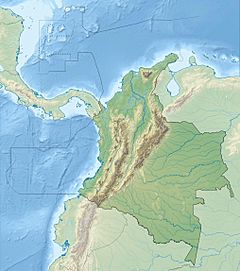Tomo River facts for kids
Quick facts for kids Tomo River |
|
|---|---|
| Country | Colombia |
| Physical characteristics | |
| River mouth | 5°20′43″N 67°49′07″W / 5.3453°N 67.8186°W |
| Length | 650 km (400 mi) |
| Basin features | |
| Basin size | 20,301 km2 ([convert: unit mismatch]) |
The Tomo River is an important river located in the country of Colombia, in South America. It is a key part of the much larger Orinoco River basin, which is one of the biggest river systems in the world. The Tomo River helps carry water and nutrients through the region, supporting many plants and animals.
Contents
Where is the Tomo River?
The Tomo River flows through the eastern part of Colombia. It is found in a region known for its wide, flat grasslands called the llanos. This area is home to unique wildlife and vast natural spaces. The river's journey ends when it joins the Orinoco River, which then flows into the Atlantic Ocean.
How Long is the Tomo River?
The Tomo River stretches for about 650 kilometers (which is about 400 miles). That's a really long way! Imagine traveling that distance, all by following the path of a river. This length makes it a significant waterway within Colombia.
How Much Water Does it Carry?
On average, the Tomo River carries about 991 cubic meters of water every second. To give you an idea, a cubic meter is like a giant box one meter long, one meter wide, and one meter high. So, imagine nearly a thousand of those boxes filled with water flowing past you every single second! This shows how powerful and important the river is for the area.
The Orinoco River Basin
The Tomo River is part of the Orinoco River basin. A river basin is like a giant bowl that collects all the rain and water from a large area. All this water then flows into one main river. The Orinoco River basin covers a huge part of South America, including parts of Colombia and Venezuela.
Why River Basins are Important
River basins are super important for the environment and for people. They provide water for drinking, farming, and transportation. They also create homes for many different types of plants and animals. The health of a river like the Tomo River directly affects the health of the entire Orinoco basin.
See also
 In Spanish: Río Tomo para niños
In Spanish: Río Tomo para niños
 | Laphonza Butler |
 | Daisy Bates |
 | Elizabeth Piper Ensley |


